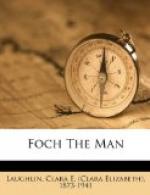At four in the morning he was at Breteuil, where General Castelnau had the headquarters of his new army, created on September 20 and designated to service on Manoury’s left. General Castelnau had not yet heard of the generalissimo’s new order. He was sound asleep when the big gray car came to a stop at the door of his headquarters after its one-hundred-and-fifty-mile dash through silent towns and dark, war-invested country.
Six weeks ago Foch had been his subordinate. Then they became equals in command. Now the magnificent hero of Lorraine who, before the war, had done so much on the Superior War Council to aid Joffre in reorganizing the army, rose from his bed in the chill of a fall morning not yet dawned, to greet his superior officer.
Some black coffee was heated for them, and for two hours they discussed the problems of this new front—Castelnau as eager to serve under Foch, for France, as, eight weeks ago, Foch had been to serve under Castelnau. If the sublime unselfishness of such men could have communicated itself to some of the minor figures of this war, how much more inspiring might be the stories of these civilian commanders!
At six o’clock Foch was under way again—to Amiens, Doullens, St. Pol, and then, at nine, to Aubigny, where General Maud’huy had the headquarters of his army, holding the line north of Castelnau’s.
The difficulties of Foch’s new undertaking were not military alone, but diplomatic. He had to take account of the English and Belgian armies, each under independent command, and each small. It was the fitness of Foch for the diplomacy needed here, as well as his fitness for the great military task of barring the enemy from the Channel ports, that determined Joffre in nominating him to the place.
In 1912 General Foch had been the head of the French military commission sent to witness the British army maneuvers at Cambridge.
He speaks no English; and not many British generals at that time spoke much French. Yet he somehow managed to get on, with the aid of interpreters, so that his relations with the British officers were not only cordial, in a superficial social way, but important in their results of deepened understanding on his part and of respect on theirs.
His study of what seemed to him the military strength and weakness of France’s great neighbor and ally was minute and comprehensive.
In his opinion, the soldiers of Britain were excellent; but he was fearful that their commanders lacked seasoned skill to direct them effectively. This lack he laid to that apparent inability to believe in the imminence of war, which was even more prevalent in Britain, with her centuries of inviolate security, than in France.
Two years before the long-suspended sword fell, Foch foresaw clearly what would be the difficulties in the way of England when she should gird herself for land conflict. Doubtless he had resolved in his mind plans for helping her to meet and to overcome them.




